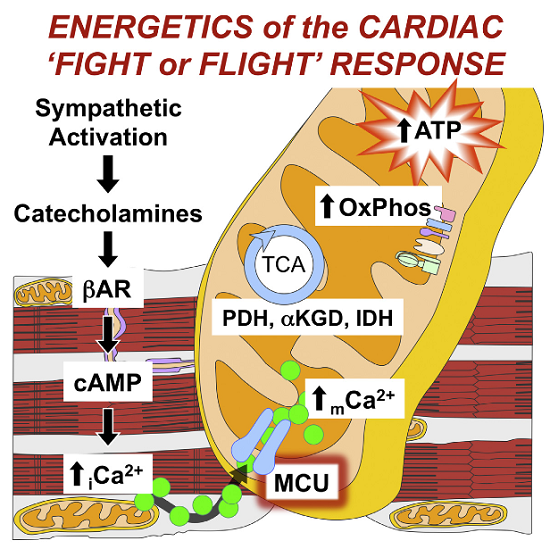Feeling stressed? Take your free radical pill. Part 3
I did mention with my previous posts that free radicals are not always harmful, so today i felt inclined to find out their advantages. As a cardiac nurse, their effects to the heart fascinate me more than anything.
Free radicals and the heart's contractility
In one study where some scientists from Swedish medical university Karolinska Institutet show that stimulation of the beta-adrenergic receptors also leads to increased production of free radicals in the mitochondria of the cells, hence contributing to stronger contractions of the cells.
How can this be? Let me try to dissect it.

Disclaimer: image from health-innovations.org
The heart's contractility
The heart contracts because of the electrical conductivity that is occurring before the heart beats. It's force on another hand is brought on by a lot of factors, one in particular is the intrinsic chemicals that get produced for example when people get stressed.
The Fight or Flight response produces a cascade of intrinsic responses when our sympathetic nervous system gets stimulated; producing catecholamines, equipping the body to respond.
Norepinephrine
Is a catecholamine that functions as a neurotransmitter and a hormone in the body. As the main neurotransmitter of the sympathetic nervous system, it is very useful in the body's fight or flight response. Through its' many functions, it is also released in many parts of the body and targets a lot of organs in its' functionality.
The general function of norepinephrine is to mobilize the brain and body for action. Norepinephrine release is lowest during sleep, rises during wakefulness, and reaches much higher levels during situations of stress or danger.
To the heart, it's effect is to pump more blood through increasing the contractility force and the heart rate induced by it's interaction with the beta1-adrenergic receptors. These receptors are located in the heart's pacemaker, hence increasing the heart rate. Some are located in the heart's top layer called myocardium, thus enhancing the heart's contractility.
Don't forget the role of CALCIUM ions intracellularly and extracellularly.
Physiologic adaptation to free radicals
As free radicals are mostly the end-product of metabolism and its' numbers growing everyday, perhaps it is an inherent adaptation of our bodies to accommodate them, making use of what is there internally in a positive way. Keeping in mind though that this is only great in a short-term, not long-term.
The heart, being stressed chronically can cause further problems in the long run.
https://steemit.com/health/@immarojas/free-radicals-and-antioxidants-part-1
References:
https://www.sciencedaily.com/releases/2011/02/110228090404.htm
https://en.wikipedia.org/wiki/Norepinephrine
http://www.physiologymodels.info/ans/adrenergic.htm
Footers from @bearone and @thekittygirl, gif from @ninjace and @deveerei



Love reading your health related posts, especially since it's relevant... I occasionally have high-blood pressure - more frequently as I get older, and have a family history of it, so your posts are quite helpful given your expertise!
Told my cousin about beet root..she's hypertensive and loves salty food.
Stroke is usually a complication and kidney failure if chronic. Perhaps i should do a hypertension post soon but it will be a part of a series. Perhaps in April.
looking forward to it!
Medicine is need everyone .Human any time feel ill than need medicine .Your post resteemit done dear
Medicine is not needed all the time.
I went for a seminar of a company that produces drugs. Their entire speech was surrounded on how their drugs help do away with free radicals that they are very harmful to the body. I never knew they help our heart. Thanks for enlightening us
Not all free radicals are harmful as what it says in some researches about it.
So in conclusion, the heart will contract stronger which free radicals? I'm sorry, I didn't get the point of increasing free radical to ensure strong contraction of the heart.
It says that when the beta1-receptors get stimulated, free radicals were formed helping in the heart's contractility. To check their theory, they used antioxidants and found that the stimulant's effect disappeared.
https://www.sciencedaily.com/releases/2011/02/110228090404.htm
https://www.ncbi.nlm.nih.gov/pmc/articles/PMC3099030/
I see, thank you for the explanation and links. That was helpful.
Am sure i have attached thosee links😂
Yeah, my bad. 😂
A scientific way of telling ourselves that we have to avoid stress and live in harmony by taking care of our body and soul, thank you.
Haha i don't think stress can be avoided very easily..but if we can't, our bodies are attuned and can respond appropriately.
Oh how to be stress-free for life lols